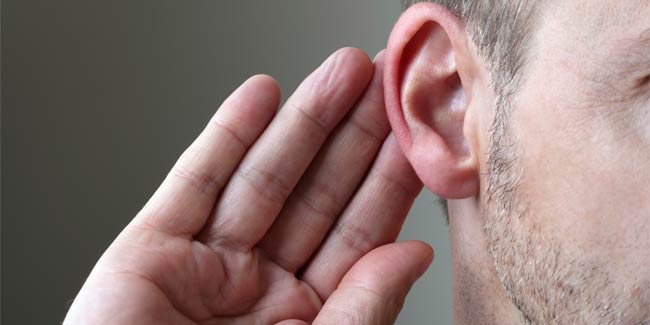
Hearing loss is when hearing is affected by a condition or injury so that the person is unable to hear the sounds clearly that lie within human audible range. Some children are born with a hearing loss while others may develop it as they get older. We hear sounds when sound waves enter the ear and cause the eardrum to vibrate. The ossicles bones, present in the middle ear, amplify the vibrations and pass them on to the inner ear. The vibrations finally make the hair cells present inside the cochlea to move in response and send a signal through the auditory nerve to the brain. If anything is not working fine in this process then the person experience difficulties in hearing, i.e. hearing loss.
Some children are born with a hearing loss while others may develop it as they get older. We hear sounds when sound waves enter the ear and cause the eardrum to vibrate. The ossicles bones, present in the middle ear, amplify the vibrations and pass them on to the inner ear. The vibrations finally make the hair cells present inside the cochlea to move in response and send a signal through the auditory nerve to the brain. If anything is not working fine in this process then the person experience difficulties in hearing, i.e. hearing loss.
Most commonly, hearing loss happens with age or is caused by loud noises. The hearing loss may be mild, moderate, severe or profound depending on various factors.
3 Types of Hearing Loss
- The first type is conductive hearing loss, where sounds are unable to pass from the outer ear to the inner ear. It usually happens as a result of a blockage caused due to wax in the outer ear, disorder of the hearing bones, a perforated ear drum, or a chronic ear infection.
- The second type is the sensorineural hearing loss in which, the tiny hair cells are damaged, either as a result of an injury or naturally due to ageing.
- The third type is, the mixed hearing loss, where both the first two types of hearing loss are present at the same time.
Hearing loss is a condition that cannot be seen by others. Even a person with hearing loss might not be initially able to realize that he/she has the problem of hearing. In children, it becomes even harder to detect this problem as they cannot identify the problem themselves. They may ignore it for a while before sharing the problem with their parents. That is why, it is very important to understand early signs and symptoms of hearing loss in children.
The symptoms may vary depending on the degree of hearing loss.
4 Levels of Hearing Loss
- First is, mild hearing loss, where the quietest sound that a person can hear is between 25 to 39dB.
- Second is moderate hearing loss, where the quietest sound that a person can hear is between 40 to 69dB.
- Third is the severe hearing loss, where the quietest sound that a person is able to hear is between 70 to 89dB.
- Final level of hearing loss is termed as profound hearing loss, where the quietest sound that a person can hear is 90dB or more.
People who are profoundly deaf can often benefit from a cochlear implant.
Sign and Symptoms of Hearing Loss
- difficulty in understanding words, especially when the background noise is loud,
- muffling of speech and other sounds,
- frequently asking others to speak more slowly, clearly and loudly.
A person should contact his/her doctor as early as possible, if such difficulties in hearing are causing inconvenience in his/her daily life. Similarly, such signs in children should be carefully observed by their parents. If the child finds it's harder to understand everything that's said in conversation, especially when there's a loud background noise or if the child tells you that the sounds he hears seem muffled, then the child's hearing may have deteriorated. If you notice that the child usually turns the volume higher while listening to music, or while watching television, then it could be possible that the child is suffering from some degree of hearing loss.
Withdrawal from conversations and avoidance of some social settings are other common signs of hearing loss. Since hearing loss can be present since birth, a toddler with hearing loss also shows some signs that can help the parents identify the problem as early as possible. A baby with hearing loss does not get startled by mild sounds. If a baby does not turn to the source of a sound while under four months old then the parents should take the child to the doctor for diagnosis of possible hearing loss. A baby with congenital hearing loss may start speaking much than a normal baby. If the baby does not say a single word by the time he/she is one year old, parents should get the baby checked for hearing loss.
Read more articles on Hearing Loss.
Read Next
Triglycerides Myths
How we keep this article up to date:
We work with experts and keep a close eye on the latest in health and wellness. Whenever there is a new research or helpful information, we update our articles with accurate and useful advice.
Current Version
